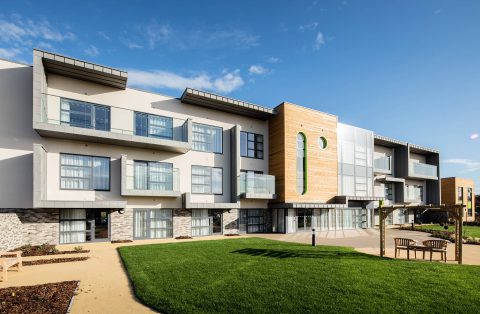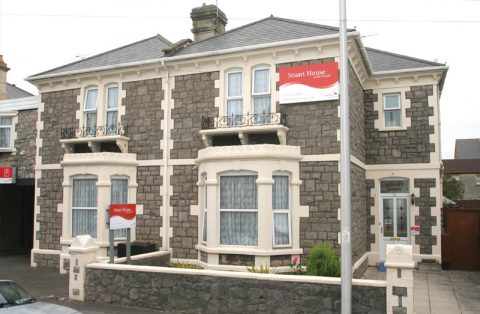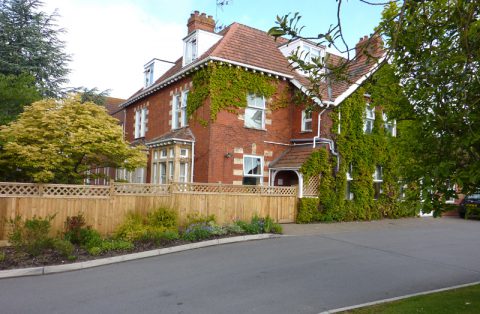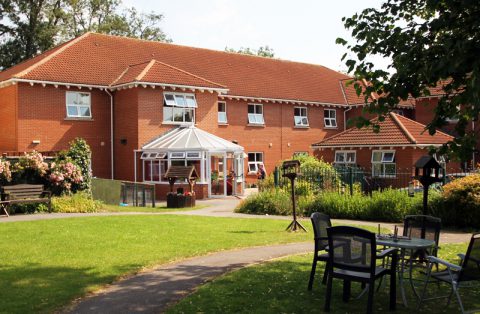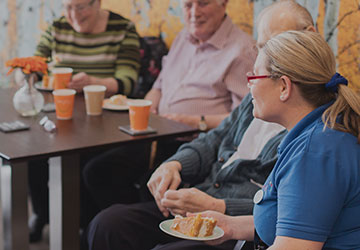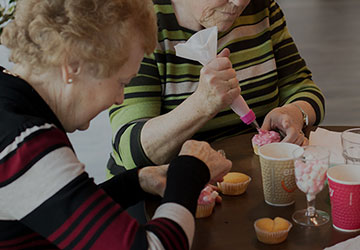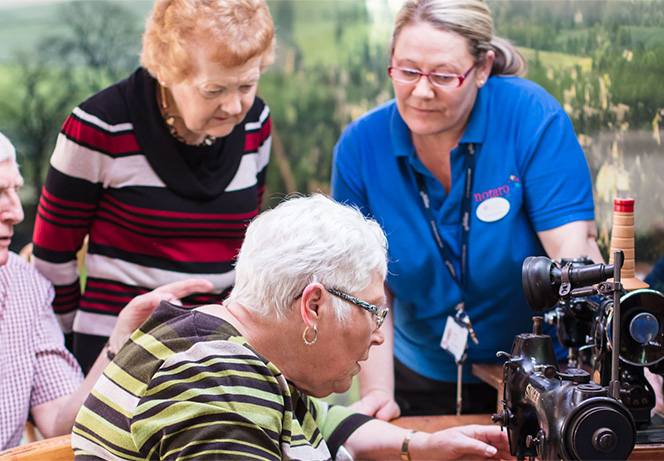FAQs: Dementia Care at Notaro Care Homes
Notaro Care Homes’ FAQs About Dementia Care
Notaro Care Homes offers high-quality dementia care across Somerset. For nearly 40 years, we’ve specialised in quality care and treating loved ones living with dementia. We understand its effect on the individual and their loved ones. At Notaro Care Homes, we provide physical and emotional care. We operate four dementia nursing homes and two residential dementia homes in Taunton, Weston-super-Mare, Bridgwater, Langport and Martock. Our experienced and compassionate team will answer your most frequently asked questions about dementia and our dementia care services.
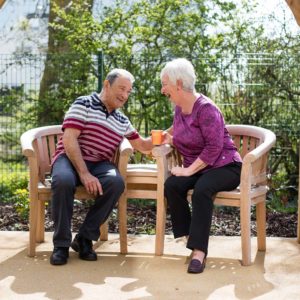
What is dementia?
Dementia is a syndrome that involves the loss of memory, thinking ability, logical reasoning, and other mental abilities. Dementia leads to an ongoing decline of brain function that eventually affects a person’s quality of life. Besides memory loss, dementia often impacts the way people think, feel, behave, and speak. There are various causes and types of dementia.
What is the difference between Dementia and Alzheimer’s?
Dementia is not a specific disorder. It’s a term to describe a decline in brain function. Alzheimer’s disease is the most common type of dementia. Alzheimer’s slowly destroys a person’s thinking skills and memory. Other common forms of dementia include vascular dementia, Lewy Body disease, and Fronto-temporal dementia.

What is vascular dementia?
Vascular dementia is the second most common type of dementia. Affecting about 150,000 people in the UK, vascular dementia is a general team describing issues with judgement, memory, planning, and reasoning. Vascular dementia is often caused by a stroke and other issues that reduce circulation and damage blood vessels.
What causes dementia?
There are many factors that may contribute to the changes in one’s brain that form dementia, including:
- Severe head injury
- Alzheimer’s disease
- Vascular dementia
- Dementia with Lewy bodies
- Parkinson’s disease
- Frontotemporal dementia
Other causes of dementia may include:
- Leukoencephalopathies
- Huntington’s disease
- Creutzfeldt-Jakob disease
- Multiple-system atrophy
- Severe infections
- Multiple Sclerosis (MS)
- Amyotrophic Lateral Sclerosis (ALS)
When should someone with dementia go into a care home?
No set time states when a person with dementia needs in-home care. The determining factors to know when it’s time to put a dementia patient in a care home include:
- A drastic change in behaviour
- Progressive decline in memory loss
- Uncommon verbal abuse and manipulation due to confusion
- A decline in daily hygiene practices
- Wandering due to confusion
- Hoarding household items or neglecting cleaning
- Forgetting to take prescription medication or taking too much of it
- Weight loss due to forgotten meals
Why is dementia progressive?
All dementia types are only in a small part of the brain in the early stages. Each dementia type impacts a different part of the brain in its earliest stages, explaining the difference of symptoms. As dementia progresses to other areas of the brain, the symptoms begin to blend together. Symptoms get worse, leading to badly damage to multiple parts of the brain.

How can I prevent dementia?
It’s challenging to prevent dementia because the cause is often hard to determine. The best ways to combat dementia include:
- Maintain a healthy lifestyle.
- Don’t smoke.
- Eat healthy food.
- Stay mentally alert by challenging yourself.
- Stay socially involved with the community.
- Manage high blood pressure and high cholesterol.
What are the seven stages of vascular dementia?
The seven stages of vascular dementia include:
Stage 1: No Cognitive Decline – Stage 1 dementia patients don’t have any signs or symptoms of memory loss or unusual behaviour. Most people cannot detect dementia in Stage 1.
Stage 2: Very Mild Cognitive Decline – Slow cognitive decline becomes more noticeable. Many times, symptoms are not evident to anyone other than the patient. They are often forgetful and cannot recall current events.
Stage 3: Mild Cognitive Decline – Stage 3 dementia patients have a noticeable decline in forgetfulness. They often have a decreased work performance, have difficulty focusing on everyday tasks, and sometimes have difficulty speaking.
Stage 4: Early-Stage, Moderate Decline Dementia – Early dementia sufferers often show an onset of noticeable cognitive decline. Most patients experience this stage of symptoms for about two years. Early dementia symptoms most commonly include:
- Difficulty concentrating
- Getting lost or losing track of time
- Fear of travelling or being alone
- Clear signs of forgetfulness
- Challenging time managing finances
- Withdrawal from social activities
Stage 5: Mid-Stage, Moderately Severe Dementia – Middle dementia patients need full-time assistance to perform daily activities. Patients often cannot complete normal activities, so this is often the time loved ones move them to a memory care living facility for proper care.
Stage 6: Mid-Stage, Severe Dementia – Stage 6 symptoms worsen, including:
- Forgetting names of loved ones
- Experience anxiety, hallucinations, and compulsions
- Experience intense personality changes
- Trouble recalling recent events
- Trouble communicating
- Loss of bladder control
Stage 7: Late Stage Very Severe Dementia – Stage 7 involves a severe cognitive decline. Late-dementia patients need 24/7 care because they cannot perform daily tasks, including walking or talking, on their own.
How many stages of dementia are there?
There are technically seven complete stages of dementia. It’s helpful for many people to break these stages into early, middle, and late, or mild, moderate, and severe. These stages help describe how dementia symptoms impact a person. Stages help explain how dementia will change over time to help prepare for the future.
How many types of dementia are there?
Though there are over 400 different types of dementia, there are four common ones. The most common types of dementia include Alzheimer’s Disease, Vascular Dementia, Dementia with Lewy Bodies, and Frontotemporal Dementia. Each type of dementia has different causes and symptoms.
What causes vascular dementia?
Vascular dementia is often caused by heart disease, stroke, and hardening of the arteries. It is most common in people 65 years of age and older.
What are the symptoms of dementia?
The most common symptoms of dementia include:
- Memory loss
- Loss of thinking speed
- A decline in mental sharpness
- Trouble speaking
- mental sharpness and quickness
- Loss of judgement
- Difficulties doing everyday activities
- Problems with behaviour
- Loss of social interest
- Experience hallucinations
What are the first signs of dementia?
The first signs of dementia are often confused with the natural ageing process. The most common first signs of dementia include:
- Memory issues with recent events
- Increased confusion
- Reduced levels of concentration
- Behavioural Changes
- Depression
How many people in the UK have dementia?
Dementia affects more than 850,000 people in the UK. This number increases each year because people live longer. At this time, one in 14 people over age 65 suffers from dementia.
Why is it important to get a diagnosis?
There is no cure for dementia, but you can be proactive to slow down the process. An early diagnosis helps many patients maintain their mental function and boost mental activity levels. A dementia diagnosis helps some patients find support and treatment. Loved ones can prepare for the future and begin looking for care homes.
Contact Notaro Homes Today
Our dementia nursing homes offer optimal care for people living with dementia. We focus on memory-building activities and helping residents connect. We reach out to residents’ family members to support loved ones. Working together, we ensure families stay involved and help their loved ones live their best life possible. Our homes are equipped to support every resident’s emotional and physical needs. We chose signage, decorations, and objects to help residents feel comfortable in their home. Contact us today to learn more!

